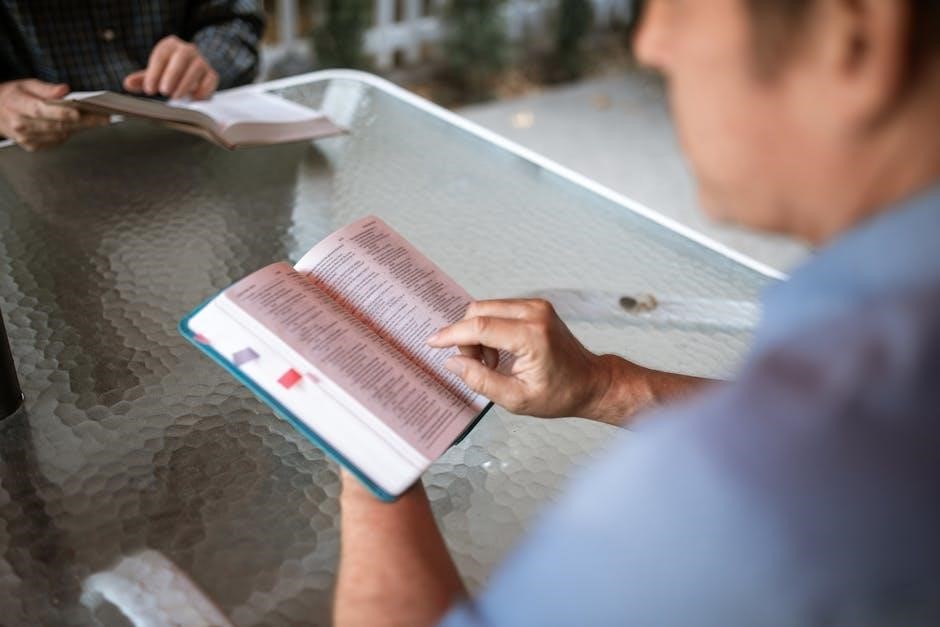Southern Baptist doctrine is rooted in the Baptist Faith and Message, emphasizing authority of Scripture, salvation through Christ, and the Holy Spirit’s role. It traces its history from the 1845 founding of the Southern Baptist Convention, marked by significant milestones, including the 1995 denouncement of racism; This doctrine shapes the denomination’s beliefs, practices, and mission, reflecting a commitment to evangelical theology and practical ministry.
Overview of Southern Baptist Beliefs
Southern Baptist beliefs are centered on the authority of Scripture, salvation through faith in Jesus Christ, and the transformative work of the Holy Spirit. The Baptist Faith and Message document outlines key doctrines, including God’s sovereignty, humanity’s sinful nature, and the necessity of regeneration through the Holy Spirit. Baptists emphasize believer’s baptism by immersion and the autonomy of local churches. They uphold traditional views on gender roles, restricting pastoral positions to men, while affirming the importance of women’s ministries. Southern Baptists are also committed to evangelism, missions, and discipleship, reflecting their dedication to the Great Commission. These beliefs shape their worship, community life, and engagement with societal issues, fostering a distinct evangelical identity.
Importance of the Baptist Faith and Message Document
The Baptist Faith and Message document is a foundational confession of faith for Southern Baptists, articulating their core theological beliefs. It serves as a unifying guide for doctrine, ensuring consistency across churches. The document addresses key issues like the authority of Scripture, God’s plan of salvation, and the role of the Holy Spirit. It also provides clarity on controversial topics, such as gender roles and church governance. Regular updates to the document reflect the denomination’s commitment to addressing contemporary challenges while remaining rooted in biblical truth. This document is essential for theological education, leadership training, and maintaining unity within the Southern Baptist Convention, making it a vital resource for understanding their faith and practices.

Historical Context of Southern Baptist Doctrine
Southern Baptist doctrine traces its origins to the 1845 founding of the Southern Baptist Convention, shaped by key historical milestones and the 1995 denouncement of racism, influencing its theological and social stance over time.
Founding of the Southern Baptist Convention in 1845
The Southern Baptist Convention (SBC) was established in 1845, primarily due to a division over slavery within the Triennial Convention. This split led Southern Baptists to form their own separate organization, which would focus on missions and church planting. The founding marked the beginning of a distinct identity for Southern Baptists, emphasizing evangelism, theological education, and cooperative ministries. The SBC quickly grew, becoming a major force in American Christianity. This historical event laid the groundwork for the denomination’s future growth and influence, shaping its doctrine and practices for generations to come.
Key Historical Milestones in Southern Baptist History
Southern Baptist history is marked by significant events that shaped its identity and mission. The Civil Rights era saw tension, with figures like Martin Luther King Jr. influencing societal change. In 1995, the SBC officially denounced racism, acknowledging past failures and committing to racial reconciliation. The denomination has also faced debates over gender roles, with controversies surrounding women in ministry. Recent years have seen efforts to address abuse and improve accountability, alongside theological discussions. These milestones reflect the SBC’s evolution, struggling with societal issues while maintaining its evangelical focus. Each event has contributed to the complex narrative of Southern Baptist history, influencing its doctrine and public witness.
Denouncement of Racism in 1995
In 1995, the Southern Baptist Convention made a historic move by officially denouncing racism. This resolution acknowledged the denomination’s past complicity in racial injustice, particularly its support for slavery during the Civil War era. The statement expressed deep regret for “the racism of which we have been guilty” and affirmed the dignity of all individuals regardless of race. This action was a significant step toward reconciliation and marked a turning point in the SBC’s commitment to racial unity. It also emphasized the importance of diversity within the church and called for ongoing efforts to address and overcome racial tensions. This denouncement remains a pivotal moment in Southern Baptist history, reflecting a desire to align with biblical teachings on equality and justice.

Core Doctrines of Southern Baptists
Southern Baptists emphasize the authority of Scripture, God’s plan of salvation, and the Holy Spirit’s role in regeneration and sanctification, as outlined in the Baptist Faith and Message.
The Baptist Faith and Message (BF&M)
The Baptist Faith and Message (BF&M) serves as the primary confession of faith for Southern Baptists, outlining their theological beliefs. Adopted in 1925 and revised in 1963 and 2000, it provides a unified statement of doctrine. The document affirms the authority of Scripture, the Trinity, and God’s plan of salvation through Jesus Christ. It also addresses church governance, the role of believers, and ethical living. The BF&M is not a creed but a guide, allowing for diversity within the Southern Baptist Convention while maintaining theological integrity. It has been influential in shaping the denomination’s identity and practices, serving as a foundational reference for Southern Baptist churches and leaders.
Authority of Scripture
Southern Baptists hold the authority of Scripture as a central doctrine. They believe the Bible is the inspired, inerrant, and infallible Word of God, serving as the ultimate authority in all matters of faith and practice. This belief is rooted in the Baptist Faith and Message, which states that all Scripture is “truth without any mixture of error.” Southern Baptists affirm that the Bible is fully reliable and sufficient for guiding individuals and the church in doctrine, morality, and life. This commitment to biblical authority underpins their theology, preaching, and decision-making, ensuring that all teachings and practices align with Scripture. The authority of Scripture is non-negotiable, shaping Southern Baptist identity and informing their approach to ministry and daily life.
God’s Plan of Salvation
Southern Baptists believe God initiated salvation through Jesus Christ, whose death and resurrection provided redemption for humanity. The Baptist Faith and Message affirms salvation as God’s gracious work, rooted in His sovereignty and love. It emphasizes that salvation is a gift received through faith in Christ, apart from human works. The Holy Spirit convicts individuals of sin and regenerates their hearts, enabling them to trust in Jesus. Southern Baptists teach that salvation is available to all, with believers assured of eternal life through Christ. This doctrine underscores humanity’s inability to save itself and the necessity of divine grace, reflecting the heart of Southern Baptist soteriology.
Role of the Holy Spirit
The Holy Spirit plays a central role in Southern Baptist doctrine, emphasizing His work in conviction, regeneration, and sanctification. According to the Baptist Faith and Message, the Spirit convicts individuals of sin, enlightens their minds, and regenerates their hearts, enabling faith in Christ. Southern Baptists believe the Spirit indwells all believers, empowering them for godly living and service. The Spirit also seals believers unto the day of redemption, guaranteeing their eternal salvation. While Southern Baptists reject charismatic gifts like tongues, they affirm the Spirit’s active role in illuminating Scripture, transforming lives, and equipping believers for ministry. The Holy Spirit’s work is essential to both salvation and the ongoing spiritual growth of believers.

Soteriology in Southern Baptist Theology
Southern Baptist soteriology emphasizes salvation through faith in Christ, highlighting God’s grace and the Holy Spirit’s role in regeneration and justification, as outlined in the Baptist Faith and Message.
Traditional Southern Baptist Understanding of Salvation
Traditional Southern Baptist doctrine views salvation as a divine act initiated by God, emphasizing humanity’s total depravity and inability to achieve salvation through works. It underscores that salvation is solely by grace through faith in Jesus Christ, with the Holy Spirit effecting regeneration and justification. This understanding aligns with the Baptist Faith and Message, which articulates salvation as a gift from God, received through personal repentance and faith. Southern Baptists also affirm the security of the believer, believing that true believers are eternally secure in their salvation. This soteriological framework is central to Southern Baptist theology and practice, shaping their evangelistic efforts and discipleship ministries.
Christ’s Role in Salvation
Christ’s role in salvation is central to Southern Baptist doctrine, emphasizing His substitutionary atonement for humanity’s sin. According to the Baptist Faith and Message, Christ’s death on the cross satisfied God’s just wrath, providing redemption for all people. His resurrection demonstrates victory over sin and death, securing justification for believers. Southern Baptists affirm that salvation is a gift of grace through faith in Christ alone, with no merit or works contributing to it. Christ’s sacrifice is seen as sufficient for all humanity, yet only effective for those who personally trust in Him. This understanding underscores the necessity of sharing the Gospel, as faith in Christ is the sole means of salvation. Southern Baptists view Christ as both Savior and Lord, essential for eternal life and spiritual transformation.
Human Response to God’s Grace
In Southern Baptist theology, human response to God’s grace involves faith and repentance, rooted in the belief that salvation is entirely God’s gift. Faith is a personal trust in Christ’s atonement, while repentance entails turning from sin to follow Him. Baptism by immersion symbolizes this spiritual transformation, publicly declaring one’s commitment to Christ. Southern Baptists emphasize that humanity’s response is enabled by God’s grace, with faith as the means to receive salvation. This response is not a meritorious act but a surrender to God’s initiative. The doctrine underscores personal responsibility to accept Christ, aligning with the Baptist Faith and Message’s articulation of salvation as a divine gift requiring human receptivity. This response is essential for spiritual regeneration and eternal life.

Ecclesiology and Church Governance
Southern Baptists emphasize local church autonomy, governed by its members, with no hierarchical authority. The Southern Baptist Convention unites churches for cooperative missions and ministry.
Autonomy of Local Churches
Southern Baptist churches operate under the principle of local church autonomy, meaning each congregation governs itself independently. This doctrine, rooted in Baptist polity, ensures that decisions regarding worship, leadership, and ministry are made locally. While churches voluntary affiliate with the Southern Baptist Convention (SBC) for cooperative missions and theological alignment, they retain full authority over their internal affairs. This autonomy reflects the belief in the priesthood of all believers and the importance of congregational governance. It allows churches to adapt to their unique contexts while maintaining alignment with broader Southern Baptist values and mission efforts. This balance of independence and cooperation is central to Southern Baptist ecclesiology.
Structure of the Southern Baptist Convention
The Southern Baptist Convention (SBC) operates as a cooperative network of autonomous churches united by shared beliefs and missions. Its structure includes elected officers, an Executive Committee, and various boards and committees overseeing denominational work. The Convention is organized into entities such as seminaries, mission boards, and auxiliary organizations. Annual meetings provide a forum for messengers from local churches to vote on policies, budgets, and leadership. This cooperative model allows churches to pool resources for missions, education, and ministries while maintaining local autonomy. The SBC’s structure balances centralized coordination with congregational governance, fostering unity in diversity among its member churches. This framework has enabled the SBC to remain a influential force in evangelical Christianity.
Role of Pastors and Church Leaders
Southern Baptist pastors and church leaders play a vital role in guiding congregations according to the Baptist Faith and Message. Pastors are responsible for preaching, teaching, and providing spiritual oversight. They are often seen as shepherds, ensuring the flock remains faithful to biblical teachings; Church leaders, including deacons and other lay leaders, support pastors in governance and ministry. The SBC emphasizes the importance of male leadership in pastoral roles, reflecting its theological stance on gender roles. These leaders are expected to uphold doctrinal integrity and foster a culture of discipleship. Their role extends beyond the pulpit, involving community engagement and missions. Through their leadership, Southern Baptist churches aim to fulfill the Great Commission and maintain a strong, unified witness. Effective pastoral leadership is crucial for the health and growth of local congregations.

Practical Theology and Ministry
Southern Baptist practical theology emphasizes evangelism, church planting, and discipleship. These ministries reflect their commitment to the Great Commission, central to their doctrine and outreach efforts.
Evangelism and Missions
Southern Baptists prioritize evangelism and missions as core ministries, driven by the Great Commission. They emphasize sharing the Gospel globally, with extensive international outreach through the International Mission Board. Local churches actively engage in community evangelism, while missions often include church planting and disaster relief. Evangelism is seen as a collective responsibility, with believers encouraged to witness in their daily lives. The denomination’s strong missionary focus reflects its commitment to spreading Christ’s message worldwide, making it a central aspect of their practical theology and ministry efforts.
Church Planting and Growth
Church planting and growth are central to Southern Baptist doctrine, reflecting their commitment to spreading the Gospel. The Southern Baptist Convention emphasizes starting new churches to reach unchurched populations, with initiatives supported by the North American Mission Board. Local churches often partner to plant new congregations, ensuring doctrinal fidelity and community engagement. Church growth strategies include discipleship, leadership training, and outreach programs. The Baptist Faith and Message underscores the importance of a reproducing church, with growth seen as a sign of spiritual vitality. This focus on multiplication aligns with their broader mission to fulfill the Great Commission, making church planting a priority in their practical theology and ministry efforts.
Discipleship and Spiritual Growth
Discipleship and spiritual growth are central to Southern Baptist doctrine, emphasizing the believer’s journey toward maturity in Christ. Rooted in the Baptist Faith and Message, discipleship is seen as a lifelong process of obeying God’s Word and walking in the Spirit. Southern Baptists encourage believers to engage in personal Bible study, prayer, and fellowship to deepen their faith. The role of the Holy Spirit is pivotal, empowering believers for sanctification and service. Churches often provide structured discipleship programs, including small groups and mentorship, to foster spiritual development. The goal is to equip believers to live out their faith authentically, reflecting Christ’s character in their daily lives and communities, while fulfilling the Great Commission through discipleship. This approach balances doctrinal integrity with practical application, ensuring holistic growth.

Controversies and Debates
Southern Baptists face debates over doctrine, gender roles, and racial tensions, reflecting internal struggles to balance tradition with societal changes and modern theological interpretations.
Debates Over Doctrine and Church Mission
Debates within the Southern Baptist Convention often center on doctrinal purity and the church’s mission. The Conservative Resurgence of the 1980s sought to reaffirm traditional theology, while recent discussions have addressed critical race theory and its compatibility with Baptist beliefs. These debates reflect broader tensions between maintaining theological integrity and addressing contemporary social issues. Some argue for a strict adherence to the Baptist Faith and Message, while others advocate for a more nuanced approach to cultural engagement. Such discussions highlight the challenges of balancing doctrinal fidelity with relevancy in a changing world, shaping the future direction of the denomination.
Gender Roles and Women in Ministry
Southern Baptist doctrine traditionally restricts pastoral roles to men, as outlined in the 2000 Baptist Faith and Message. This stance has sparked significant debate, with some advocating for women’s leadership in ministry. Prominent figures like John Piper and Beth Moore have influenced these discussions, reflecting broader evangelical tensions. While some argue Scriptural support for male-only pastors, others emphasize giftedness and calling regardless of gender. The issue has led to division, with over 1,400 Southern Baptist women signing a letter against restrictive comments. These debates highlight the challenges of balancing theological tradition with modern understandings of gender equality, shaping the denomination’s approach to women’s roles in church leadership and ministry.
Racial Tensions and Reconciliation Efforts
The Southern Baptist Convention has faced significant racial tensions, historically rooted in its complex past. In 1995, the denomination officially denounced racism, acknowledging its historical failures. However, racial divides persist, with debates over systemic injustice and representation. Recent efforts, such as the 2019 resolution on critical race theory, reflect ongoing struggles to address these issues. Initiatives like the SBC’s Racial Unity and Reconciliation Ministry aim to foster healing and diversity. Despite progress, challenges remain, as highlighted by investigations revealing racial disparities in leadership and discrimination reports. The SBC continues to navigate reconciliation efforts, emphasizing unity in Christ while addressing the complexities of racial tensions within its ranks and broader society.

Recent Developments in Southern Baptist Doctrine
Recent updates to the Baptist Faith and Message address modern issues, while the SBC navigates debates over leadership and social challenges, reflecting ongoing doctrinal evolution.
Updates to the Baptist Faith and Message
The Baptist Faith and Message (BF&M) has undergone revisions to address contemporary issues while maintaining core theological integrity. The most recent updates reflect the denomination’s response to modern societal changes, ensuring the document remains relevant. These revisions emphasize the authority of Scripture and clarify positions on gender roles, marriage, and human dignity. The updates are designed to provide guidance for Southern Baptists in navigating current cultural and theological challenges. While the core doctrines remain unchanged, the amendments offer a framework for applying timeless truths to modern contexts, fostering unity and clarity within the denomination.
Responses to Modern Social Issues
Southern Baptists have actively engaged with modern social issues through their doctrinal framework. The denomination has addressed racial reconciliation, emphasizing unity in Christ and denouncing racism, as seen in the 1995 resolution. Gender roles remain a focal point, with the SBC maintaining a traditional view of male leadership in the church, sparking debates and responses from Southern Baptist women. These responses reflect the denomination’s commitment to applying biblical teachings to contemporary challenges, ensuring their doctrine remains relevant while upholding core theological convictions.

Challenges and Future Directions
The Southern Baptist Convention faces challenges such as internal debates over doctrine and church mission, particularly regarding gender roles and racial reconciliation. Recent controversies, including responses to abuse allegations and discussions on women in leadership, highlight the need for unity and clarity. Moving forward, the SBC must navigate these issues while maintaining its commitment to evangelical theology. Efforts to address modern social concerns, such as racial tensions and gender equality, will be crucial for fostering a more inclusive and unified body. The denomination’s future likely hinges on its ability to adapt to societal changes while remaining faithful to its core beliefs, ensuring the Baptist Faith and Message continues to guide its mission and ministry effectively.

Southern Baptist doctrine, rooted in the Baptist Faith and Message, continues to shape the denomination’s identity and mission. Its teachings remain influential in society, guiding believers in faith and practice while addressing modern challenges and fostering unity amidst diversity.
Southern Baptist doctrine, outlined in the Baptist Faith and Message, emphasizes the authority of Scripture, salvation through Jesus Christ, and the Holy Spirit’s role in regeneration. It affirms the autonomy of local churches and the importance of evangelism, missions, and discipleship. The doctrine also addresses controversial issues like gender roles and racial reconciliation, reflecting a commitment to biblical integrity and cultural engagement. While challenges persist, Southern Baptist teachings remain a guiding force for millions, shaping their understanding of God, humanity, and the church’s mission. The doctrine’s enduring relevance lies in its ability to address historical and modern issues while staying rooted in evangelical theology.
Impact of Southern Baptist Teachings on Society
Southern Baptist teachings have profoundly shaped societal norms, particularly in the U.S., through their emphasis on evangelical values and community engagement. Their missions and church planting efforts have contributed to social programs, education, and disaster relief, fostering tangible community impact. The denomination’s stance on moral issues, such as family values and human dignity, has influenced public discourse. However, controversies, like debates over gender roles and responses to abuse allegations, have sparked criticism and calls for reform. Despite challenges, Southern Baptist teachings continue to inspire millions, promoting a vision of faith that seeks to transform both individual lives and societal structures. Their influence remains a significant force in shaping cultural and religious landscapes.
Final Thoughts on the Baptist Faith and Message
The Baptist Faith and Message serves as the cornerstone of Southern Baptist doctrine, providing a clear articulation of beliefs. It underscores the authority of Scripture, salvation through Christ, and the Holy Spirit’s role, offering a theological framework that guides the denomination. While debates over certain teachings persist, the document remains a unifying force. Its emphasis on evangelism, missions, and discipleship continues to inspire believers. As Southern Baptists navigate modern challenges, the Baptist Faith and Message stands as a testament to their commitment to biblical truth and their mission to share the Gospel. Its enduring relevance ensures it will remain central to Southern Baptist identity and ministry for generations to come.
